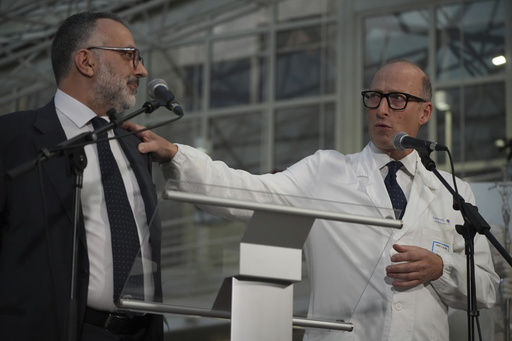ROME — The medical team caring for Pope Francis provided an update on his health on Friday, indicating that while his complex respiratory infection is not considered life-threatening, he is still in a precarious situation. The 88-year-old pontiff has spent over a week in the hospital dealing with pneumonia affecting both lungs, in addition to battling bacterial, viral, and fungal infections exacerbated by his chronic bronchitis.
The doctors from Rome’s Gemelli hospital informed that Pope Francis is expected to remain under care well into the following week. They noted that he is receiving supplemental oxygen intermittently and is responding positively to enhanced drug therapy aimed at tackling the multiple infections he faces.
Dr. Sergio Alfieri and Francis’ personal physician, Dr. Luigi Carbone, confirmed that the pope is maintaining a positive attitude despite his health challenges. Alfieri shared a light-hearted exchange where, upon being addressed as “Holy Father,” the pope humorously referred to him as “Holy Son.”
Alfieri responded to inquiries about the pope’s risk status, stating, “No, the pope is not out of danger. If you ask whether he is in a life-threatening situation, the answer is also no.” He elaborated that the pontiff had recently taken the time to pray in the chapel, affirming, “He is the pope, but he is also a man.”
Pope Francis entered Gemelli hospital on February 14 after a week of worsening bronchitis, which ultimately developed into pneumonia along with chronic bronchitis. The doctors emphasized a need for “absolute rest.” Alfieri explained that the pontiff contracted a seasonal infection that has been impacting many individuals, but noted the uniqueness of Francis’ role as a governing leader at his age.
Reflecting on the pope’s work ethic, Alfieri characterized him as generous and a known workaholic, mentioning that while Francis has been a commendable patient during his hospital stay, he tends to prioritize his duties over his health. Carbone added that Francis had a history of being devoted to the church above personal care.
Currently, the pope is contending with a multifaceted infection caused by various pathogens affecting his respiratory system. Fortunately, doctors found no evidence suggesting that the infection has progressed to sepsis, which could result in organ failure and is a major concern for older patients. While he does require supplemental oxygen, he is not dependent on further medical machinery.
Alfieri also indicated that due to long-standing chronic bronchitis, there has been some lasting damage to Francis’ airways, characterized as bronchiectasis. Treatment involving cortisone has led to increased blood sugar levels, thus requiring management for diabetes. However, he expressed optimism that this condition would be temporary.
In an ideal recovery scenario, Alfieri predicted that the pope would return to his residence without the active infections, though his chronic health issues would persist. As news of his hospitalization continues to circulate, some cardinals have begun to contemplate the possibility of a papal resignation should Francis become permanently incapacitated. While Francis has remarked on the topic following Pope Benedict XVI’s precedent, he has displayed no current inclination to resign, affirming that the role of pope is intended to be for life.
Francis previously disclosed that he prepared a resignation letter soon after his election, anticipating situations that might prevent him from fulfilling his papal responsibilities. Nevertheless, there have been no indications of him being incapacitated or considering resignation. Throughout his hospital stay, he has continued performing certain papal duties, including appointing bishops. Following a prior hospitalization, he showed displeasure at rumors regarding preparations for a potential conclave to select his successor.
Although Francis is particularly vulnerable to respiratory infections, especially during the winter months, doctors cautioned that pneumonia can pose significant complications for elderly patients. Despite being 88, he carries additional health concerns, including excess weight, reduced mobility requiring a wheelchair due to knee issues, and a history that includes the removal of part of one lung.
Even amidst the seriousness of his condition, moments of humor have arisen. Alfieri shared an anecdote about explaining the need for continued hospitalization, to which the pope quipped about the implications of confessing.
